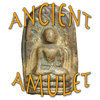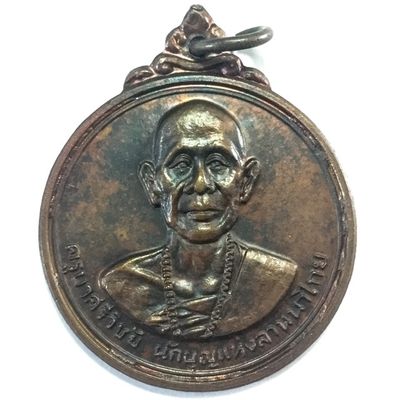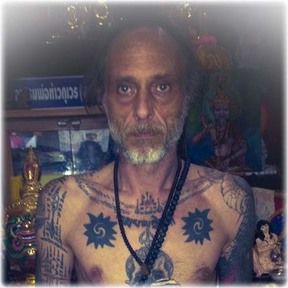Online Only 24/7/365 Based in Krabi Thailand.
Krabi
24/7
Monday-Sunday
12:00 am - 12:am

Sacred Rian Kanajarn Guru Monk Coin with the Image of the Great Thai Lanna Master Monk Kroo Ba Sri Vichai, sat beneath a tree in meditation on the front face, and prowling tiger on the rear face, in Nuea Tong Daeng Sacred Copper Alloy, released in 2520 BE at Wat Sri Soda, in Chiang Mai.
A highly prized but also highly affordable amulet for the sacred image of the Great Lanna Guru Master Monk Kroo Ba Srivichai, and for the powerful blessings given by some of the Great Lanna Tradition Master Monks of that Era present during the ceremony.
Kroo Ba Srivichai was known as the 'Engineer Monk'. The architectural skill involved in creating the centuries-old chedis and temples that abound in Northern Thailand are a source of wonder in themself. Much of this beauty, however, would have been lost to future generations, but for the dedication and guidance of a man revered by many as the Buddhist saint of northern Thailand, Kroo Ba Sri Vichai.
When Kroo Ba Srivichai ordained as a young Samanera Novice Monk, he surprised even his teachers with his enthusiasm for knowledge, and his impeccable behavior. Within two years, he was ordained as a monk with the name of Siri Wichayo Bhikhu and became known to all as Pra Sriwichai.
Below, the top of the rear face of the coin says 'Nak Bun Haeng Lanna' (Meritorious Saint of the Lanna People), with a tiger prowling, and below, the words 'Wat Sri Soda 2520 BE'
During the following four years, the young monk earned, through his devotion to the care of all who came in contact with him, the title - Kruba - (someone who is generous, compassionate, and thoughtful to the needs of others). Kroo Ba Sri Vichai rose to become abbot of his local wat, and set about designing and building a new temple for the district; the old one having fallen into disrepair.
Kroo Ba Sri Vichai wandered the length and breadth of his district, helping the poor and the sick. Being simple, rural people, however, they revered their young abbot to a degree that led to jealousy and malice among local officials, and within the priesthood itself. False accusations abounded, and on at least two occasions, he was jailed for alleged offences against the community.
The accusations ranged from ordaining novices without his superior's permission, to inciting rebellion among the people of the region. This persecution of Kruba included reducing him from abbot to ordinary monk, and an order was issued that he should be banned from Lamphun, and given no shelter or sustenance by the monks of any wat in the province.
Kruba refused the order to leave, and remained among his disciples. He was then commanded to appear before the Prince of Lamphun to answer the allegations. But, as he made his way to Lamphun City, his small group grew to several thousand strong as it was joined by fellow monks and villagers from throughout the province. Fearing the local police would be unable to control such a crowd of, albeit peaceful protestors, the monk's case was referred to the Prince ruler of neighboring Chiang Mai, for judgement.
It was agreed that Kruba should proceed to Chiang Mai, but with just four of his many disciples to accompany him. On arrival, however, his followers were prevented from accompanying him, and he alone was detained in Wat Sri Don Chai, where he remained for many months. The people of Chiang Mai flocked to the temple with offerings of food and refreshment for the disgraced monk. The case was proving too controversial for any Chiang Mai officials to handle, and with public sympathy growing for Kruba, his case was referred to Bangkok.

The public persecution of the man had become a matter of national importance. Head of the Buddhist monastic order, the Prince Supreme Patriarch, Somdej Pra Maha Samana Jao, would make the final judgement. In the summer of 1920, Kruba was found not guilty, and at the age of 42, still clear of eye and mind but physically frail, he left Bangkok by train for his homeland in the North. When his train pulled into Lamphun station, Kroo Ba Sri Vichai was met by a large crowd of people from across the social spectrum.
It appeared that the rich and powerful had joined the poor in their adulation of the monk. Throughout the years of his public abuse by officials, Kruba never once lost his serenity; remaining calm and dignified. Admiring these qualities, and recalling the monk's talent for restoration, the Prince of Lamphun province invited Kruba to take up residence in Wat Jamathaewee, an ancient temple that had fallen into disrepair.
Accepting the invitation, the monk set about restoring the wat to its former glory, and began a program of reconstruction throughout Northern Siam that would earn him the title of "the developer monk." Within 19 years, Kruba renovated and built 105 old and new temples altogether in the provinces of Lamphun, Chiang Mai, Chiang Rai, Payao, Lampang, Sukhothai, and Taak.
Kruba's work was not confined to the rebuilding of temples. Under his guidance: schools, bridges, government buildings, and roads, most notably the road from Chiang Mai to Wat Pra Thart Doi Suthep, were constructed. Construction on the Doi Suthep road got underway in 1934, and took almost six months to complete 11.5 Kilometers.
Prior to this, none but the hardiest of pilgrims made the five hour climb up the densely wooded mountainside to visit, what is still today one of Thailand's most sacred Buddhist temples. (The Pilgrim's walking path is still in use today by the faithful and those looking for a good workout.)
Five years after the completion of the Doi Suthep road, Kruba fell ill, and was taken back to the village of his birth, Ban Paang, in Lumphun province, where he died in his 61st year. His funeral was attended by thousands; royalty to rural workers came from across the nation to pay homage to a simple farmer's son who grew to become the Buddhist saint of northern Thailand. Kroo Ba Sri Vichai's monument lies at the foot of Doi Suthep beside the road he created, allowing millions of pilgrims and tourists access to Wat Phra That Doi Suthep.

Because we guarantee delivery or money back/replacement, and Guarantee Authentic with real Blessings with all our amulets. Postage is Free Worldwide for all orders amounting to under 300 grams (60 grams for USA and Canada). We give Gifts with all orders large or small. Buying is Easy with our Secure Payment Gateway using Debit, Credit Card or Paypal, with customer protection built in by Paypal. Guaranteed Satisfaction with our 'You Can't Lose' policy, where we guarantee you that your item will be delivered, or if not, we replace or refund you. It is impossible to lose when you choose Us as your trusted supplier of Thai Buddhist Amulets and Occult Charms.
Good Service, only authentic amulets, and very Generous to customers, who always receive a nice gfift with every order! highly appreciated. Ajarn Spencer's knowledge induces great trust in the authenticity of the amulets in store


Ajarn Spencer
Author and Mystic
Ancient Amulet is Owned by Thai Buddhism and Occult Author, Ajarn Spencer Littlewood, who Guarantees Our Service with His Name. If there is one thing for which Ajarn Spenceris publicly known for, it is his Honesty, and his liking to Practice Generosity, which is one of the reasons Ancient Amulet has a rule that all customers receive minimum one free gift (amulet) of value with every order.
Online Only 24/7/365 Based in Krabi Thailand.
Krabi
24/7
Monday-Sunday
12:00 am - 12:am